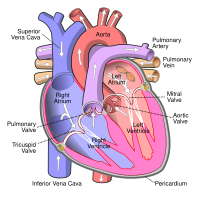
Photo from wikipedia
Background Percutaneous balloon pulmonary valvuloplasty is the procedure of choice for uncomplicated severe or symptomatic pulmonary stenosis. The present study describes our experience in balloon pulmonary valvuloplasty using the Inoue… Click to show full abstract
Background Percutaneous balloon pulmonary valvuloplasty is the procedure of choice for uncomplicated severe or symptomatic pulmonary stenosis. The present study describes our experience in balloon pulmonary valvuloplasty using the Inoue balloon catheter in adolescent and adult patients. Aims To assess the immediate and mid-term outcomes of percutaneous balloon valvuloplasty with Inoue balloon catheter in adolescent and adult patients. Methods and results Between June 2010 and July 2015, we performed percutaneous balloon pulmonary valvuloplasty with Inoue balloon catheter in 32 patients (59.37% females) aged 8 to 54 years (mean 23.6 ± 11.5). Following the procedure, the mean right ventricular systolic pressure and the pulmonary valvular peak-to-peak systolic gradient decreased from (121.6 ± 42.4 to 61.19 ± 24.5 mmHg, p = 0.001) and (100.9 ± 43.3 to 36.4 ± 22.5 mmHg, p = 0.001), respectively. Twenty patients (Group A) showed immediate optimal results with post-procedure peak systolic gradient <36 mmHg while 12 patients (Group B) had suboptimal results. An increase in pulmonary regurgitation by one grade was detected in 17 patients (53.2%). Twenty-three patients available for follow-up (mean duration, 2.75 years [range 0.25–5 years]) had a mean residual peak gradient of 23.6 ± 2.51 mmHg on Doppler echocardiography with attenuation of reactive RVOT stenosis in all Group B patients. There was no further increase in grade of pulmonary regurgitation or restenosis on mid-term follow-up. Conclusion Percutaneous Inoue balloon technique is an attractive alternative with excellent mid-term results for adolescents and adults with isolated pulmonary stenosis.
Journal Title: Indian Heart Journal
Year Published: 2017
Link to full text (if available)
Share on Social Media: Sign Up to like & get
recommendations!